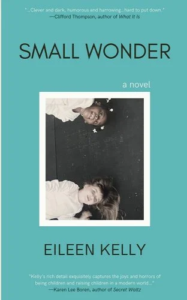|
Good morning, friends. It has been a week, hasn't it?
I'll get right to sharing what we published lately, so if I go on a bit afterward and lose anyone they won't miss what's important and won't hold my blathering against these fine writers.
 On Monday, Hannah Rice Berman reviewed Small Wonder, a novel by Eileen Kelly and published by Flexible Press. We're grateful to publish Hannah's writing for the first time, and you'll find more of her work at her website. On Monday, Hannah Rice Berman reviewed Small Wonder, a novel by Eileen Kelly and published by Flexible Press. We're grateful to publish Hannah's writing for the first time, and you'll find more of her work at her website.
Then on Wednesday our featured story was "By Act Three, the Gun Must Go Off" by Lindsey James. I'll resist saying too much because I want the story to speak for itself, but what stood out to me when I first read Lindsey's story was how powerfully and how bluntly it undermines the idea that violence is an act or event rather than a culture that permeates wherever it is.
+
I don't have any contributor updates this week, but if you have news or announcements I'm unaware of please let me know for the future. And if you're a writer whose book has been swallowed by the vacuum of current events, you have my sympathy. I've been there. In 2016, a day or two after the election, I was at the first — ultimately the only — bookstore event for my novel Scratch. I shared the bill with the brilliant Ha Jin, whose novel The Boat Rocker had also been published a few days earlier (we were paired by the store, in a gesture more flattering to me than to him).
We each read, then took questions, and someone in the audience asked — gently, with curiosity rather than snark — why the novels we were promoting that night were important, why they were worth reading, in the face of what had occurred at the polls and what was likely ahead. Each of us, in our own way, answered with a version of, "Well, I worked on this for a long time but now I don't know." And I can't speak for Ha but my book went on to go nowhere through a combination, I suppose, of novels about lonely men wandering the forest and tangling with bears no longer seeming urgent if they ever had, and a shady publisher collapsing under the weight of its dealings but that's another conversation.
I still couldn't say if or why that novel matters because I wrote it and published it in a different world than the one into which it was received and from which it quickly went out of print.
 I have been listening repeatedly, obsessively, to Bach's cello suites this week. Different recordings and different cellists — Anner Bylsma, Pablo Casals, Peter Wispelwey. It's music I've returned to for decades, music I go to for restoration, and lately the variations and repetitions of different artists making the suites their own have felt buoying and right, which is about the extent of my ability to say anything musically knowledgeable, so don't wait for it. For most of those listening years I didn't know that Bach's compositions also went out of print, so to speak, and were rediscovered by a young Pablo Casals — a history explored in Eric Siblin's excellent book The Cello Suites: J. S. Bach, Pablo Casals, and the Search for a Baroque Masterpiece. To think that something so vital, something it is hard for me to imagine the world not containing, might have been lost. I'd call it painful to imagine but it's more inconceivable, absurd, because I wouldn't be who I am with the feelings I have so I might be some other person not capable of enjoying Bach's compositions at all. I'm not musically wise enough to explain why Bach's suites are important, why they matter tonally, historically, compositionally, however one measures these things. I know why they matter to me. I have been listening repeatedly, obsessively, to Bach's cello suites this week. Different recordings and different cellists — Anner Bylsma, Pablo Casals, Peter Wispelwey. It's music I've returned to for decades, music I go to for restoration, and lately the variations and repetitions of different artists making the suites their own have felt buoying and right, which is about the extent of my ability to say anything musically knowledgeable, so don't wait for it. For most of those listening years I didn't know that Bach's compositions also went out of print, so to speak, and were rediscovered by a young Pablo Casals — a history explored in Eric Siblin's excellent book The Cello Suites: J. S. Bach, Pablo Casals, and the Search for a Baroque Masterpiece. To think that something so vital, something it is hard for me to imagine the world not containing, might have been lost. I'd call it painful to imagine but it's more inconceivable, absurd, because I wouldn't be who I am with the feelings I have so I might be some other person not capable of enjoying Bach's compositions at all. I'm not musically wise enough to explain why Bach's suites are important, why they matter tonally, historically, compositionally, however one measures these things. I know why they matter to me.
On Bluesky the other day, the artist Jeremy Millar wrote,
David Wojnarowicz, after Zoe Leonard showed him her photos of clouds: 'These are really, really beautiful, and that’s what we are fighting for. Don’t give up on beauty, We’re fighting so that we can have that… The goal is to get through this mess so that we can make beautiful work about clouds…'
I can never remember the science of clouds, however many times I remind myself, or exactly what they are doing, but like Bach's music I know what they're doing for me and I'm always glad for a moment with them. I have also been grateful this week for Domyo Burk's Zen Studies Podcast and returned yesterday to last year's episode on "The Medicine of Emptiness When Witnessing Suffering and Injustice". Domyo reminds us that being open to Emptiness and to stepping outside the narratives with which we comfort ourselves when faced with challenge is only the first step toward compassion and action, not an end in itself because it might leave us dispassionate and disengaged. The goal, and I'm probably putting it roughly, is to open ourselves to all the ways of being in and seeing the world that are not our own — not to say anything goes, leave it be, there's not reason to act, but instead to go gentler, make it be, and act with more intention. Whether that act is to make beautiful work about clouds or to compose and perform music or to make stories and poems and whatever we need to bring out. Even if we can't explain why or what it is for or what someone else's work might be for either.
All of which, I suppose, is a far, far too long winded way of me saying there's a reason the slogan I chose for Necessary Fiction is "Doing our best," because that's all we're ever trying to do and all we can do and what we'll keep doing as long as we can. Though next time I promise to do it with fewer words.
Hear some cello today. See some clouds. Be kind to yourself and to each other, and bring into the world what you think needs to be here.
Thanks for reading,
Steve Himmer |